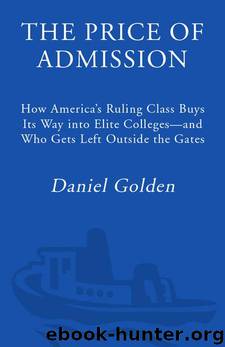The Price of Admission: How America's Ruling Class Buys Its Way into Elite Colleges--and Who Gets Left Outside the Gates by Daniel Golden

Author:Daniel Golden [Golden, Daniel]
Language: eng
Format: epub
Publisher: Crown Publishing Group
Published: 2009-01-16T08:00:00+00:00
AFTER MORE than thirty college coaches tried to recruit Ty Grisham, he accepted a baseball scholarship at the University of Virginia in 2001. The school got more than an outfielder. Ty's father, John Grisham, best-selling author of The Firm and other legal thrillers, had often donated money to help renovate the scruffy ballparks where his son played ball. Sure enough, once his son was on the team, he stepped up to the plate with more than $1 million to renovate the university's decrepit stadium.
But the coach who had ardently pursued the novelist's son soon cooled on the freshman. Ty batted only ten times in a little more than two seasons and finally quit the team in 2004. His son's experience has left the elder Grisham wondering why his son was wooed by the Virginia coach in the first place. “There were some schools that wanted my son, and there were a handful that wanted me,” said the elder Grisham. “It's no secret I've given a lot of money to youth baseball.”
In college athletics, money doesn't just influence a school's choice of which sports to sponsor or eliminate. It also intrudes on a realm usually considered a bastion of meritocracy—the selection of players. Not only do rich students have access to more sports than lower-income applicants, and thus more opportunity to leverage athletic skill into college admissions, but they also have a better chance than other athletes of equal ability to be recruited or picked for the varsity team.
While coaches pursue top players based on their abilities, some borderline candidates are helped by factors other than physical prowess. Children of wealthy alumni and donors sometimes are given slots on teams even if they're out of their league athletically, in the hope that their parents will renovate a locker room or a sprinkler system. In some ways, the recruitment process is akin to a sandlot baseball game where two children choose sides. Hoping to win, the captains pick the best players first. But, after divvying up the good players, they'll give an edge to the kid who brought the bat and the ball.
For some privileged players, who are marginal academically as well as athletically, a coach's interest may tip the scale with the admissions office. Others likely would have been accepted anyway but still divert roster slots and sometimes scholarship money from equally skilled players. Although they often are frustrated with their lack of playing time, they benefit from the prestige, networking, and career opportunities that come with a spot on a college sports team.
Parents “pull strings or they donate so they can call their kid a student-athlete even though the kid's not actually out there performing,” Curtis Brown told me. He's a former college baseball coach who works for the Baseball Factory in Columbia, Maryland, which links high school prospects with college teams. “They're able to tell somebody, ‘My kid plays baseball at the university” That person they're talking to has no clue that the kid is the seventh option in the outfield.
Download
This site does not store any files on its server. We only index and link to content provided by other sites. Please contact the content providers to delete copyright contents if any and email us, we'll remove relevant links or contents immediately.
| Administration | Assessment |
| Educational Psychology | Experimental Methods |
| History | Language Experience Approach |
| Philosophy & Social Aspects | Reform & Policy |
| Research |
The Art of Coaching Workbook by Elena Aguilar(51198)
Trainspotting by Irvine Welsh(21665)
Twilight of the Idols With the Antichrist and Ecce Homo by Friedrich Nietzsche(18632)
Fangirl by Rainbow Rowell(9249)
Periodization Training for Sports by Tudor Bompa(8271)
Change Your Questions, Change Your Life by Marilee Adams(7780)
This Is How You Lose Her by Junot Diaz(6886)
Asking the Right Questions: A Guide to Critical Thinking by M. Neil Browne & Stuart M. Keeley(5775)
Grit by Angela Duckworth(5614)
Red Sparrow by Jason Matthews(5472)
Paper Towns by Green John(5191)
Room 212 by Kate Stewart(5120)
Ken Follett - World without end by Ken Follett(4731)
Housekeeping by Marilynne Robinson(4447)
The Sports Rules Book by Human Kinetics(4386)
Papillon (English) by Henri Charrière(4274)
Double Down (Diary of a Wimpy Kid Book 11) by Jeff Kinney(4271)
The Motorcycle Diaries by Ernesto Che Guevara(4098)
Exercise Technique Manual for Resistance Training by National Strength & Conditioning Association(4071)
